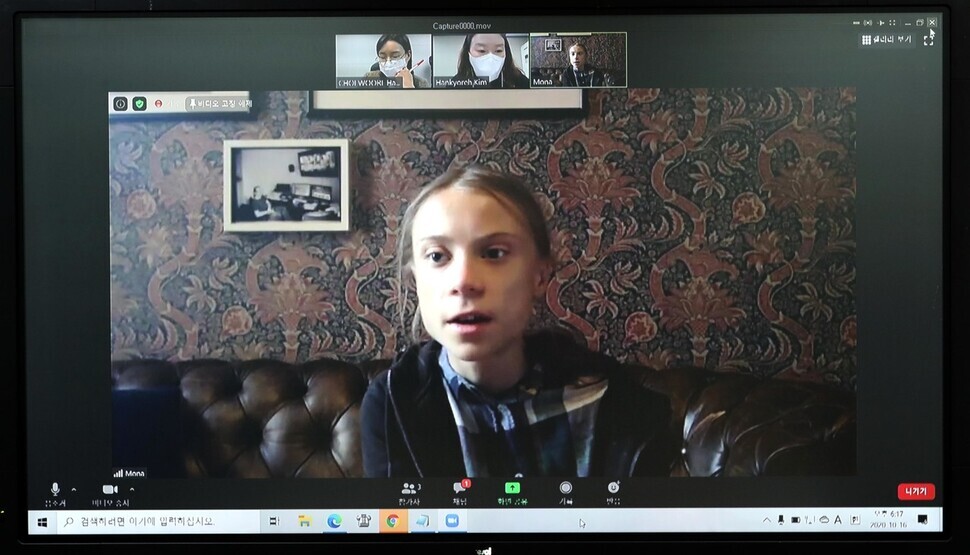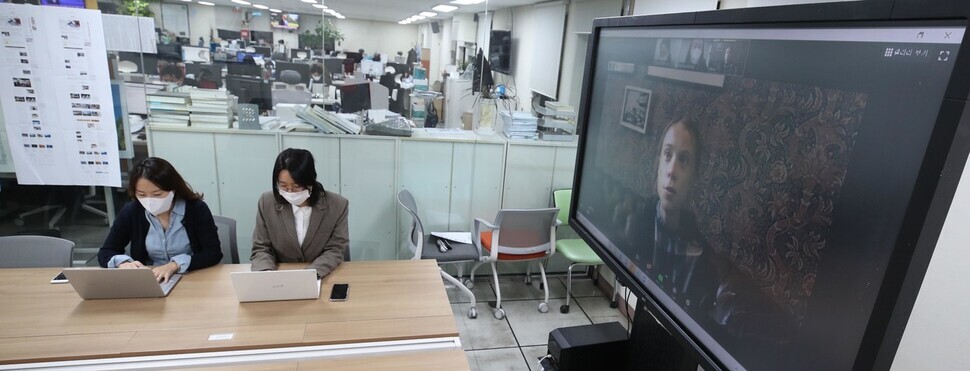hankyoreh
Links to other country sites 다른 나라 사이트 링크
Greta Thunberg is like a canary in a coal mine

On Friday, Oct. 9, people who are concerned about the climate crisis were waiting with bated breath for the Nobel Peace Prize announcement, scheduled for 6 o’clock that evening.
“The climate crisis is getting attention, but people already seem to be getting sick of the topic. If Greta wins the Nobel Peace Prize, I think it might help people take the climate crisis seriously once again,” said Kim Bo-ram, 27, a non-teenage member of Korea’s teenage movement for climate change. Kim was hopeful that Greta Thunberg, the 17-year-old environmental activist from Sweden, would win the Nobel Peace Prize.
Since it was Friday evening, just before the weekend, I hoped that Thunberg would win the prize, too — although that would require me to stay up late to write a story on it. In the end, the World Food Programme won the prize, and I didn’t have to stay up. But just as Kim said, I think that Thunberg winning the prize would have gotten people’s attention and reinforced their attitudes about the climate crisis.
As it happens, I was the Hankyoreh reporter on the social policy desk who conducted a video interview with Thunberg at 6 pm on Friday, Oct. 16, one week after the Nobel Peace Prize was announced. (See the Hankyoreh article “Greta Thunberg tells Moon that ‘actions speak louder than words’ when it comes to climate change.”) I worked on that interview with Kim Ji-eun, who is on the Ministry of Foreign Affairs beat.
It was this past April when the Hankyoreh suggested an interview with this global celebrity, who now has about 15 million followers on Twitter and Instagram. My first assignment after joining the Hankyoreh’s climate change team was writing an email to Thunberg in English. Since she is one of the leading figures in the discourse on climate change, I wanted to ask her about the severity of the climate crisis. After trying to track down Thunberg’s email address, I had an email forwarded to the head of her media team through Climate Media Hub, a global network of communication experts in the area of climate change.

But when I heard back from Thunberg’s media team, what they told me is that Thunberg has a full schedule and wasn’t available for an interview. So I told them we would be happy to do an interview whenever she was available, which turned out to be six months later. From what I hear, Thunberg gets interview requests from all around the world. I’m told that Thunberg agreed to an interview with the Hankyoreh because we’re South Korea’s only media organization with a climate change team and because we regularly publish articles about energy and the environment.
It’s too bad that Thunberg wasn’t available for an in-person interview because of the coronavirus pandemic. But in the end, a virtual interview was probably more convenient considering that Thunberg once sailed across the Atlantic to avoid the greenhouse gas emissions produced by airplanes.
As soon as Thunberg appeared on screen, someone handed her the red water bottle she always carries around. She took a swig, and the interview began. While watching her videos, I’d always thought she had a gift for speaking, and she was adept at expressing her ideas. She called for change while making clear that many countries still haven’t achieved the changes in attitude and policy that are necessary to tackle the climate crisis.
Thunberg replied cautiously to questions about the ways in which the environment clashes with the economy and development, rather than making unilateral pronouncements. Her sincerity was evident in her no-nonsense attitude, her piercing eyes, and the conviction that suffused her voice. Though she’s a teenager, her wisdom exceeds her biological age. When I asked her a personal question — if she was happy to be back at school — I glimpsed some of the innocence one would expect from a 17-year-old high school student.
Sounding the alarm on a global crisisAfter Thunberg’s face vanished from the screen, I was left with several emotions. As I wrote in the article, seeing her face, which looked more gaunt than last year (Thunberg has anorexia nervosa), reminded me of a “canary in a coal mine.” It occurred to me that this 17-year-old environmental activist was one of the first people on earth to perceive global changes and sound the alarm, like the canary whose death would alert miners to rising levels of carbon monoxide in a mine shaft.
Fortunately, Thunberg seemed to be dealing with the pain better than the canary. She has shared her experience with those who are depressed over the climate crisis and has taught them that taking action is better than sinking further into depression.
The day I wrote my article, Thunberg wrote on social media calling for the release of 12 Hong Kongers who were jailed by China after taking part in a democracy protest. She also posted a message in the memory of Ruth Bader Ginsburg, former justice of the US Supreme Court, who was idolized for her progressive rulings and her advancement of women’s rights.
I could sense that Thunberg’s worldview is gradually growing broader. I look forward to keeping an eye on this teenager, who has become one of the most influential people in the world, and seeing how she changes the world.
By Choi Woo-ri, staff reporter
Please direct comments or questions to [english@hani.co.kr]
Editorial・opinion
![[Column] When ‘fairness’ means hate and violence [Column] When ‘fairness’ means hate and violence](https://flexible.img.hani.co.kr/flexible/normal/500/300/imgdb/original/2024/0516/7417158465908824.jpg) [Column] When ‘fairness’ means hate and violence
[Column] When ‘fairness’ means hate and violence![[Editorial] Yoon must stop abusing authority to shield himself from investigation [Editorial] Yoon must stop abusing authority to shield himself from investigation](https://flexible.img.hani.co.kr/flexible/normal/500/300/imgdb/original/2024/0516/4417158464854198.jpg) [Editorial] Yoon must stop abusing authority to shield himself from investigation
[Editorial] Yoon must stop abusing authority to shield himself from investigation- [Column] US troop withdrawal from Korea could be the Acheson Line all over
- [Column] How to win back readers who’ve turned to YouTube for news
- [Column] Welcome to the president’s pity party
- [Editorial] Korea must respond firmly to Japan’s attempt to usurp Line
- [Editorial] Transfers of prosecutors investigating Korea’s first lady send chilling message
- [Column] Will Seoul’s ties with Moscow really recover on their own?
- [Column] Samsung’s ‘lost decade’ and Lee Jae-yong’s mismatched chopsticks
- [Correspondent’s column] The real reason the US is worried about Chinese ‘overcapacity’
Most viewed articles
- 1China calls US tariffs ‘madness,’ warns of full-on trade conflict
- 2[Column] US troop withdrawal from Korea could be the Acheson Line all over
- 3[Editorial] Yoon must stop abusing authority to shield himself from investigation
- 4[Column] When ‘fairness’ means hate and violence
- 5[Column] How to win back readers who’ve turned to YouTube for news
- 6US has always pulled troops from Korea unilaterally — is Yoon prepared for it to happen again?
- 7[Book review] Who said Asians can’t make some good trouble?
- 8Naver’s union calls for action from government over possible Japanese buyout of Line
- 9Could Korea’s Naver lose control of Line to Japan?
- 10[Editorial] Korea must respond firmly to Japan’s attempt to usurp Line